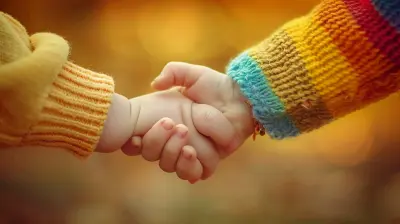Teaching Toddlers Empathy: Small Steps for Big Hearts
22 May 2025
Empathy, in its simplest form, is the ability to understand and share the feelings of others. It’s that warm, fuzzy quality that forms the backbone of kindness, compassion, and meaningful human connections. Now imagine planting those seeds of empathy in a toddler. Sounds tricky, doesn’t it? After all, toddlers are notoriously self-focused by nature (cue the "mine!" phase). But here’s the truth: they’re also like little sponges, soaking up the world around them and mirroring what they see.
The good news? Teaching toddlers empathy isn’t just possible—it’s crucial for their emotional and social development. It’s not about grand gestures or formal lessons. Instead, it’s about small, intentional steps that help shape their big hearts. Let’s dive into how you can nurture empathy in your little one in ways that are simple, effective, and even fun. 
Why Is Teaching Empathy Important for Toddlers?
First things first. Why should you even bother teaching empathy to a toddler who’s still learning how to share their snacks? Well, empathy is like a superpower. It helps kids build strong relationships, handle conflicts, and grow into understanding and compassionate adults.Empathy isn’t just about being “nice.” It’s about recognizing that someone else has feelings—just like you. For toddlers, this understanding lays the foundation for emotional intelligence, a skill that research shows is even more important than IQ in predicting long-term success.
Plus, we live in a world that could use a little more kindness, don’t you think? By teaching empathy early, you’re raising not just a child, but a good human being. 
When Should You Start Teaching Empathy?
You might be wondering: “Isn’t my toddler too young for this?” The short answer is no. While toddlers don’t have the cognitive maturity to fully grasp someone else’s perspective yet, the roots of empathy start to grow as early as the first year of life.By age 2 or 3, many toddlers begin to show the earliest signs of empathy. You’ll notice this when your child tries to comfort a crying friend or shares a toy (without being forced—hallelujah!). These little moments are golden opportunities to reinforce empathy.
Think of empathy like a muscle—it gets stronger the more you exercise it. The earlier you start, the bigger and stronger it can grow over time. 
How to Teach Empathy in Toddlers: Small Yet Impactful Steps
Here’s the thing: teaching empathy isn’t about sitting your toddler down for a lecture or reading them a dictionary definition. (Spoiler alert: they’ll tune out faster than you can say “time-out.”) Instead, it’s all about weaving empathy into everyday moments.1. Be the Empathy Role Model
Toddlers are experts at mimicking. They’ll copy everything you do—whether it’s dancing in the kitchen or losing your cool in traffic. So, if you want to teach empathy, you’ve got to walk the walk.Show your toddler what empathy looks like in real life. For instance:
- Acknowledge others' feelings: “That little boy looks sad because he dropped his ice cream. Should we help?”
- Express kindness yourself: “I’m going to help Grandma carry these bags because they look heavy.”
When they see you practicing empathy, they’ll learn that it’s something valuable and worth doing.
2. Label Feelings
Toddlers are still figuring out what emotions even are. Helping them label their own feelings—and others'—is a critical step. Make it as simple as possible:- “You’re feeling frustrated because your block tower fell down.”
- “She’s crying because she feels sad her balloon popped.”
By naming emotions, you’re giving your toddler the tools to understand and navigate feelings. It’s like giving them a little emotional dictionary!
3. Encourage Perspective-Taking
Granted, toddlers don’t easily understand the concept of “walking in someone else’s shoes” (let’s be real, they sometimes refuse to wear shoes at all). But you can still gently guide them toward thinking about how others might feel.For example, if they grab a toy from a friend, ask:
- “How do you think that made them feel?”
- “What could you do to make them feel better?”
Even if their answers are off the mark at first, don’t sweat it. The goal is to get them started on thinking beyond just their own needs and wants.
4. Use Storytelling as a Teaching Tool
Books are an amazing way to teach empathy without it feeling like a “lesson.” Choose stories that highlight emotions, friendships, and acts of kindness. While reading, ask open-ended questions like:- “Why do you think this character is sad?”
- “What would you do to help them?”
Reading is like a magic doorway that lets your toddler explore the world from someone else’s perspective.
5. Create Opportunities for Kindness
Empathy doesn’t just live in their heads—it’s something they practice with their hands and hearts. Encourage small acts of kindness that let your toddler “practice” empathy, like:- Sharing snacks or toys with a friend.
- Helping a sibling find their favorite stuffed animal.
- Drawing a picture for someone who is feeling unwell.
These tiny acts may seem minor, but they pack a big punch when it comes to teaching your child how good it feels to care for others. 
What If My Toddler Struggles with Empathy?
Okay, let’s be real for a second. Despite your best efforts, there will be meltdowns, toy-snatching, tantrums, and moments where your toddler seems more like a tornado than a budding empath. That’s okay!Empathy is a skill that takes time to develop—it’s a marathon, not a sprint. Here’s how to stay the course:
- Be patient: Toddlers are naturally egocentric at this stage. They’re not being “bad”—it’s just normal development.
- Focus on effort, not perfection: Celebrate small wins, like when they say sorry without being prompted or offer to share a cookie.
- Keep modeling empathy: Even if it feels like you’re talking to a wall, trust that your actions and words are sinking in.
Remember, no toddler is an empathy expert overnight. It’s a messy, beautiful work in progress for both of you.
The Long-Term Benefits of Teaching Empathy
So, what happens if you stick with it? What’s the payoff of those countless “How do you think they feel?” conversations?Empathetic kids grow up to be emotionally intelligent adults. They’re better equipped to:
- Build strong friendships and relationships.
- Handle conflicts with less drama.
- Show compassion in a world that desperately needs it.
And let’s face it, isn’t raising a kind and caring human one of parenting’s ultimate goals?
Teaching empathy might not always feel glamorous—and some days, it’ll feel downright frustrating—but it’s worth every ounce of effort. Because those small steps you’re taking today? They’re shaping your toddler into someone who will make the world a kinder, better place tomorrow.
Final Thoughts
Teaching toddlers empathy is not about perfection—it’s about progress. It’s about planting seeds of kindness and watering them with patience, love, and consistency. Some days, those seeds will sprout in surprising ways (like when your toddler hugs a crying friend without being asked). Other days, it may feel like nothing’s growing. That’s okay. Keep at it.Because here’s the truth: small steps really do lead to big hearts. And in a world that can sometimes feel tough, raising an empathetic child is one of the most powerful, world-changing things you can do.
all images in this post were generated using AI tools
Category:
Parenting ToddlersAuthor:

Austin Wilcox
Discussion
rate this article
3 comments
Davina Spencer
Empathy blooms in everyday moments; nurture it with patience and love.
June 8, 2025 at 4:46 AM

Austin Wilcox
Thank you! I completely agree—every small moment of connection can help cultivate empathy in our little ones.
Jonah McFarlin
Love this! Teaching toddlers empathy lays the foundation for kind hearts and strong friendships. Remember, small steps can lead to big changes! Celebrate every little moment of compassion they show—it's a joy to watch their hearts grow as they learn! Keep it up!
May 25, 2025 at 3:15 PM

Austin Wilcox
Thank you for your wonderful insights! Celebrating those small moments of compassion truly makes a big difference in fostering empathy in toddlers. Let's keep encouraging their growth!
Otto McAndrews
This article offers fantastic tips for nurturing empathy in toddlers! Small, intentional actions can truly shape their emotional growth. Love the practical suggestions for fostering big hearts in our little ones!
May 25, 2025 at 3:14 AM

Austin Wilcox
Thank you for your kind words! I'm glad you found the tips helpful for nurturing empathy in toddlers. Every small step truly makes a difference!



